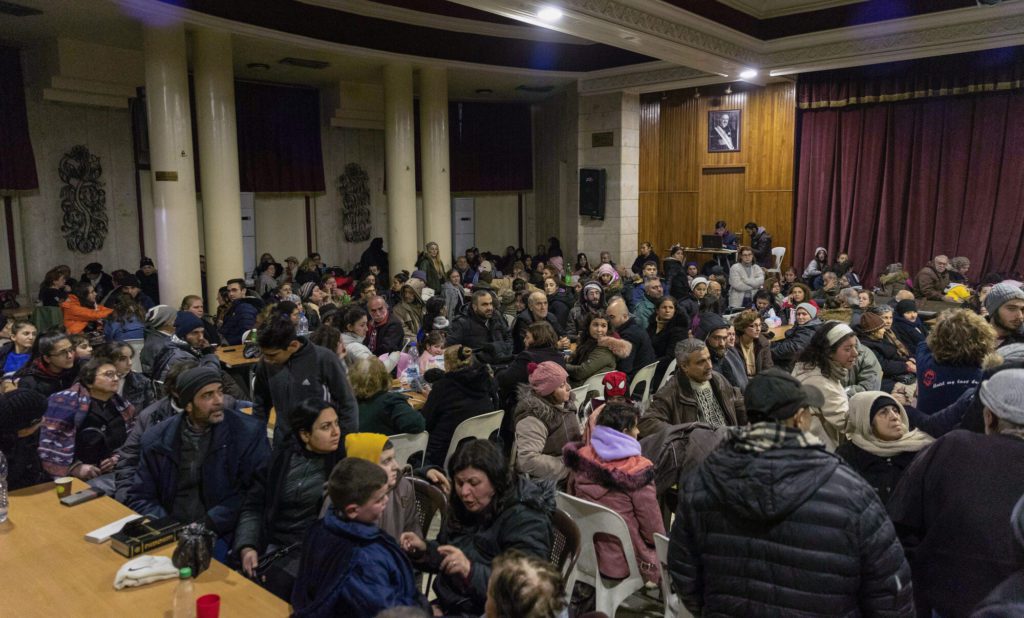

As the tragic toll of the Feb. 6 earthquakes continues to unfold in Syria, Mennonite Central Committee (MCC) is working with long-term partners in Aleppo and surrounding areas to meet urgent needs.
When an earthquake of 7.8-magnitude followed hours later by a 7.5-magnitude quake struck northwestern Syria and southeastern Türkiye, it dealt a devastating blow in Syrian communities already suffering from years of conflict.
“We are only beginning to see the enormity of this disaster,” says Garry Mayhew. He and his wife Kate, based in Beirut, are MCC representatives for Lebanon, Syria and Iraq.
“The sheer numbers of lives lost, injured and displaced are overwhelming, and numbers will continue to grow in the days ahead,” Mayhew says.
Over the past decade in Syria, many buildings had been damaged by war and neglect, making them vulnerable to shocks from the earthquake. Families who have been displaced by conflict often live in unfinished and unsafe buildings at higher risk for collapse.
Many buildings came down in the quake, MCC partners in Syria are reporting. Hundreds of aftershocks have added to damage and trauma, and cold weather is worsening rescue efforts and survivors’ struggles.
MCC is responding in Aleppo and surrounding areas by working with partners who are opening shelter centers in churches and community buildings and providing emergency food, shelter, hygiene, sanitation supplies and trauma counseling.
“Many of our partners have been involved with relief work for the last 12 years of the Syrian war. This has allowed them to quickly pivot to supporting those who are displaced by the earthquake,” Mayhew says.
But the needs are immense.

“People are continuing to pour in and the needs for urgent items (food, water, blankets, mattresses, diapers, etc.) keep growing,” Mayhew says. “Many partners, staff and volunteers, who are supporting others, are also displaced with damaged homes, and are dealing with their own losses and trauma.”
For many Syrians, this burden, on top of years of war, feels too heavy to carry, Mayhew says.
“It is critical that we stand with those who are suffering at this time,” he says. “Many Syrians feel forgotten by the world after so many years of suffering. We must help them know that they are not forgotten, that we see their pain and stand with them.”
In addition to meeting immediate needs, MCC will be working with partners to determine longer-term projects and responses.
In the U.S., people can contribute to MCC’s response by giving online at mcc.org/earthquake, by calling 888-563-4676 or by sending a check earmarked for “Syria and Türkiye earthquake” to MCC, PO Box 500, Akron, PA 17501.
Since 2011, MCC has worked to meet urgent needs of people affected by conflict in Syria. This is one of MCC’s largest humanitarian responses in a century-long history. In addition to MCC’s emergency response to the earthquake, MCC continues to work with partners, both churches and other civil society groups, to provide emergency assistance such as food baskets, clothing, hygiene supplies and winterization supplies. MCC also offers programs to help people recover their livelihoods and provides psychological and trauma training to help people affected by more than a decade of violence. MCC’s work includes advocating for a peaceful solution to the conflict in Syria and other places around the world.
Editor’s Note: MCC is using the spelling of Türkiye that the country has requested the international community use and that the UN and Canadian and U.S. governments are using.


Mennonite Central Committee is a global, nonprofit organization that strives to share God’s love and compassion for all through relief, development and peace. MCC is committed to relationships with their local partners and churches. As an Anabaptist organization, they strive to make peace a part of everything they do.






















